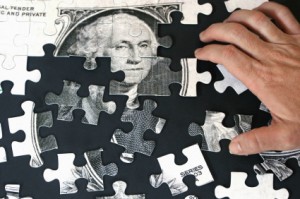 (This post is written jointly with Ago Cluytens, and will appear jointly on both our sites.)
(This post is written jointly with Ago Cluytens, and will appear jointly on both our sites.)
Ago: Recently, Charles H Green (I get to call him Charlie) and I had a heart-to-heart about three seismic shifts that are completely changing the way buyers and sellers relate. Even though we live on different continents and have had dramatically different careers we interestingly both saw the same things happening – albeit from slightly different perspectives.
Charlie: Well Ago, we’ve outlined this general topic of what’s different in sales. But that’s pretty broad. Let’s break it down, as you suggested, to several themes that may be easier to address.
Ago: Sure. Let’s start with the elephant in the room. Are we in a Crisis of Confidence, where “selling” no longer sells? What do you think?
CG: Of course it depends on what you mean by each of those terms, but basically – I agree with you. What I mean by that is that two things have changed fundamentally in just the last ten years.
– Buyers have become more suspicious of the intentions and motives of sellers;
– Buyers now have access to far, far more information.
The result is a more empowered, cynical customer base. The traditional observation is that “the balance of power has shifted” to the buyer. But to state it that way is to miss the great opportunity facing sellers and buyers alike – to move away from defining the sales relationship as one of competitive, zero-sum entities, and toward collaboration and mutuality. The one road that is not going to work is trying to regain the power in the old game.
AC: You know, I like the way you focus on collaboration and mutuality. As you know, I used to be a management consultant. The second I started realizing that what my clients were looking for was not for me to tell them what to do, but to jointly figure out the problem and develop a solution that solved it, that changed my entire outlook – as well as the results I was getting.
Similarly, when I became an entrepreneur, I instinctively realized that (sales) success would not come from desperately trying to “sell someone,” but instead from finding those people for whom my service offering could be a potential solution and working together to define the best way to move forward.
If we can get over the “me versus you,” winner-take-all mindset and get into a mood of collaboration and joint problem solving, both sides win. Better deals are made, better terms are negotiated and better outcomes are reached.
CG: In that vein, let’s talk about the changing role of the buyer, and then of the seller as well, shall we? I’ll start us off with the role of the buyer.
As I see it, a couple of things have changed. One, as noted above, is that the buyer has access to more information. But the information itself is only part of the story there. The information they now have access to used to be available only through interaction with the seller. And now they have access to it without having to talk to a seller.
Now, that is a change in dynamics. Because, think of it: when you’re a buyer starting out in a purchase process, you probably know less than the sellers about the sellers’ offerings. So you feel at effect of, trapped, suspicious, cautious, hesitant and careful; because the information you need is being doled out to you by the seller, whose interests have always been perceived as lying in selling you the product. You are at their mercy.
For a buyer these days, those chains are gone. The only seller interactions that are required are high-level, complex questions (e.g. “have you ever combined this with an existing CRM system?”); and when the interaction happens, the customer is already highly educated. All that power game stuff is gone. The buyer feels empowered.
AC: You know, in addition to what you mentioned, there’s something even more subtle at play. It is a well-known fact that as the amount of information and choice available increases it actually has an adverse effect on our ability to make decisions and move forward.
Everything from our mobile devices to billboards spews out “information” 24/7, meaning we are slowly but surely buried under an avalanche of data. According to Mashable, 571 new websites are created, 100,000 Tweets are sent and 204 million e-mails are sent every minute. I mean, every minute.
And the effect this has on buyers is simple: total, complete overload. They stay stuck. Don’t move. The most effortless, most comfortable and safest path is always the same: to do nothing.
AC: So let’s talk a little bit about what that means if you’re a seller. Our new role as sellers is no longer to push our wares to the top of the pile, but to help the buyer stand back and make sense of the pile in the first place. Put in slightly more intellectual terms, our job is to be curators and advisors to our clients – not product pushers.
Generally speaking, there are three major trends I am seeing that set apart those who will be successful in the future (of sales) versus those who have been so in the past.
1. They think buying first, selling second. Meaning they see things from the buyer’s perspective, can “step into their shoes” and can often define the problem better than their buyer can
2. They start adding value from the second they meet – they do not wait for someone to be “qualified” before they start helping them, but understand that relationships are built over time and the best way to make change happen is to lead the way
3. They produce clarity, not complexity – they use their experience and broader viewpoint to help the buyer make sense of reality, the various options available and develop a process for making decisions.
And, as is often the case, precisely because they do those three things, they win a disproportionate percentage of all the deals they go after. That’s what I mean when I say “Stop selling. Start helping your buyer buy.”
If you combine the three trends I outlined, an interesting picture of the seller starts to emerge. Not a sleazy “used car salesman”, but a highly valued, trusted confidant and advisor.
CG: Wow, that’s interesting; I pretty much agree. I would only add that the seller has to change roles, given the shift in information availability, and in the dynamics of the interaction. The right way for the seller to interact today is to make it as easy as possible for the customer to get all the information they might want – without having to first talk to me.
That goes against every instinct of the seller; sellers have been taught to tightly control information, don’t discuss price until you’ve talked value, that sort of thing. It’s not easy to just give it away, with no trick strings attached, and then take on a very passive role, waiting for the buyer to come to you. But that’s part of the challenge.
I’d argue that the biggest role change for sellers is the need to change their objective. Big picture – as long as salespeople hold to the view that the objective of sales is to sell to the customer, they’ll have trouble. They have to change their objective, to that of “always be helpful” to the customer. Viewed way, sales become an effect, rather than the goal.
CG: Now Ago, that gets us to the next Big Category – changes in the shift of power. What’s your take on that?
AC: You know, Charlie, here’s what I am thinking. I believe that – to a certain degree – there has been a shift of power. Buyers are now more informed, more educated and more aware of their relative position of power than ever before.
But, in my experience, the most sophisticated buyers still approach the buyer-seller relationship from the same perspective as before. They don’t see sellers as predatory hunters who are out to “get them,” nor do they view them as subordinates who provide a commodity service and can be endlessly squeezed on price. And – just because they have more information – they understand that does not always mean they have more power.
If I were to make an analogy, most C-suite buyers I am in contact with view those selling to them as dance partners. Equal counterparts that provide a valuable and needed complement to what they see, know and understand. And with (the best of) whom, they are joined at the hip and need each another to produce the kind of results they want.
CG: We both agree that there has certainly been a shift of power, from the seller to the buyer. But that’s just what’s happened – that doesn’t tell us the answer. And the answer for sellers does not lie in regaining power. It lies in changing the game radically, for the benefit of both parties, to focusing on adding value and improving the customer’s business. There is an element of faith here – faith that if you consistently put client interests first, clients will tend to reciprocate, and become interested in buying from you.
If you as a seller just can’t handle that idea – if your feeling is “I can’t let them have that kind of control, they’ll abuse it and ruin me,” then you’re going to have a hard time. Because you have lost power already. And until you figure out how make one plus one equal to at least three, you haven’t got a replacement game.
AC: I think what we’re both saying is that this Big New Idea isn’t entirely new – this trend started many years ago – but it’s very, very Big. And at its core, that idea is simple: selling is about building trusted relationships.
The kind of relationships that allow you to view long-term, gain a common perspective, collaborate, share insights, and generally allow for the synergies that can only happen when working with people you trust.
And when done right, something magical happens. Like watching a pair of expert dancers whirl across the room in some Buenos Aires tango palace. They instinctively understand each other, know when to seamlessly transition from leading into following, when to move and when to pause. Not unlike a sales process, I might add.
The end result is something that goes way beyond “two people on a dance floor.” That’s how long-term, multi-million dollar relationships are built.
CG: Absolutely. The days of zero-sum competition are over; you have to add value, and the only way to add more value than others is to establish better relationships with the client. To do that, you have to build trust. And to build trust, you have to abandon the old sales objectives of gaining share of wallet, conquering competitors, maximizing price, and so forth; instead, you have to adopt one over-arching objective – to improve things for your client. And then believe that by so doing, you too will benefit.

 A long time ago, in a land far away (known as “Texas”), I once had a consulting client. They operated a chain of convenience stores, and we had been brought in to address a serious case of high store manager turnover.
A long time ago, in a land far away (known as “Texas”), I once had a consulting client. They operated a chain of convenience stores, and we had been brought in to address a serious case of high store manager turnover. I always have trouble answering a question I’m often asked: What company does a great job on trust? Because the answer is some combination of, “it depends on the definition of trust,” and “hardly any.” Let me unpack that.
I always have trouble answering a question I’m often asked: What company does a great job on trust? Because the answer is some combination of, “it depends on the definition of trust,” and “hardly any.” Let me unpack that. If you’re a lawyer, accountant, management consultant, VAR, systems engineer, financial advisor, CRM expert, architect, IT services consultant or even an HR consultant – odds are that you’re ineffective at selling. That’s the bad news.
If you’re a lawyer, accountant, management consultant, VAR, systems engineer, financial advisor, CRM expert, architect, IT services consultant or even an HR consultant – odds are that you’re ineffective at selling. That’s the bad news. In my
In my  Differentiation. It’s one of the
Differentiation. It’s one of the  (This post is written jointly with
(This post is written jointly with 